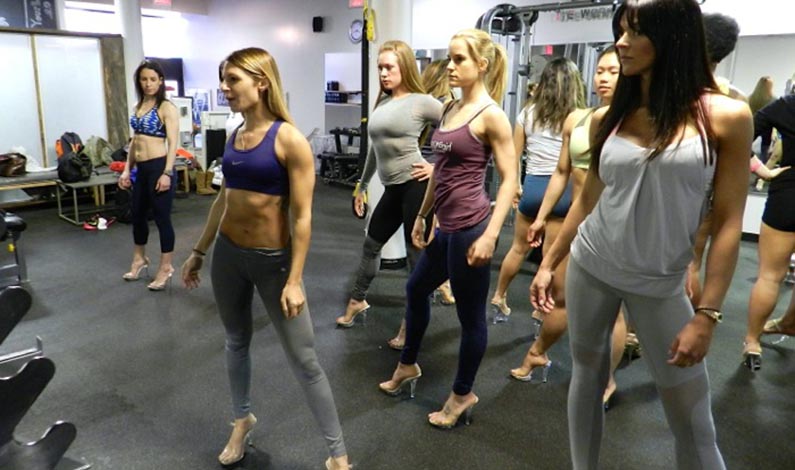On a recent Saturday afternoon, Chelsea boutique gym The Works was filled with young women trying out poses in front of mirrors—rolling up their Lululemon and Athleta tanks to see how their abs looked and wobbling in their new five-inch Lucite heels—while coaches offered feedback.
“I like the leg bent, but it’s about what’s comfortable and what looks best for your body.” “Wear your heels all day, like when you’re cooking, so you get used to them.”
The women were part of Team Works, New York City’s premier group for aspiring “bikini” bodybuilding competitors, of which there are a growing number in the city.
“Bikini is huge now,” says Jennifer Searles, a former national champion figure competitor and owner of The Works who now guides the team of about 80 to their own sculpted victories. The “bikini” category was first introduced in 2010, alongside figure (which demands a more hard, muscular physique) and fitness (which involves gymnastic demonstrations), and it opened up the sport of bodybuilding in a new way.
“There’s a more of a mainstream population of females getting into it because it’s much more of an attainable physique,” Searles explains of the ideal that’s more like your badass, super-cut spin instructor, not a muscles-bulging model on the cover of a weight-lifting magazine. And in a fitness landscape that now includes hordes of workout-obsessed women who jump from SoulCycle to Barry’s Bootcamp classes on the same day, it offers up a new way for them to display the fruits of their sweaty labor.

Getting in Show-Shape
“It’s a little bit daunting at first,” admits Natalie Gargiulo, a 30-year-old manager at Athleta who was a constant presence at fitness studios all over the city—from boot camp to barre—before being drawn to “this process of transforming and testing yourself.”
Gargiulo and other women like her meet with Searles or another coach initially (and then for check-ins every three to four weeks) to get photos and measurements taken and discuss their body and workout history before being given a personalized training plan.
That plan includes about an hour of cardio and 45 minutes to an hour of lifting per day, Searles says, which the women can complete on their own time, at any gym. “That’s the training part,” she explains, “and then there’s the diet part, which is another full-time job.”
Samantha Katz, a 26-year-old executive assistant and fitness model who is both a competitor and a coach, agrees. “Most people can make it into the gym for an hour…it’s the 23 other hours that are the struggle,” she says. “I weigh and measure every meal, every ounce of protein and gram of carb, and put it in baggies.” She once brought a cooler filled with pre-measured food to a friend’s wedding and says that the stringent plan put a strain on some of her relationships and her social life.
And once you’re in shape, it’s on to the smaller details, like tanning, heels, bikini, and as mentioned earlier, learning the art of posing. “The posing can make or break you, it really can,” says Searles. If you don’t stick your booty out in the most effective way, someone else will.

What Drives Them
“I never thought I could be the girl with abs, never in a million years,” says Katz, who, like every single woman I spoke to, pointed to the idea of a long-term fitness goal as the thing that drove them.
“I grew up in the dance world and was always working towards dance competitions,” says Gargiulo. “I found that now I was working out for mental, physical, and emotional health…but I missed having an ultimate goal.”
A finish line, of any kind, is a motivating thing. It’s like the shiny, spray-tanned version of the marathon running boom. Except, of course, for the fact that success in a marathon is dependent on personal ability and preparedness, whereas success in a bikini competition is subject to a stranger’s judgment of a body’s aesthetic value.
Bikini Body Image
Which is why it was surprising that that the word women used most often to express why they loved competing was that the process was truly “empowering.” It’s that same urge that has people posting victorious post-workout selfies on Instagram…just oiled up, and on stage.
Katz says she dealt with serious body image issues in the past and that the struggle motivated her to put it all out there and get past them, despite how terrifying it was. “Here I am about to walk on stage in the tiniest bikini you could possibly wear and say ‘Okay judges, judge me,’” she says. “But for me it was about the fact that I was going to step on stage and do that, and it was the first time I ever felt confident in my own skin and in my own body. I wanted to go up there and say ‘I may not have the body you’re looking for, but this is the best friggin’ body I’ve ever had, and I want to show it off.”
Gargiulo is looking for the same kind of fulfillment as she prepares to make her on-stage debut this spring. “It obviously has the potential to really knock somebody down,” she says, “but there’s something really great about working towards it and getting up on stage and saying, ‘Here I am, look at what I’ve created.’” —Lisa Elaine Held
Courtesy of: Well + Good
